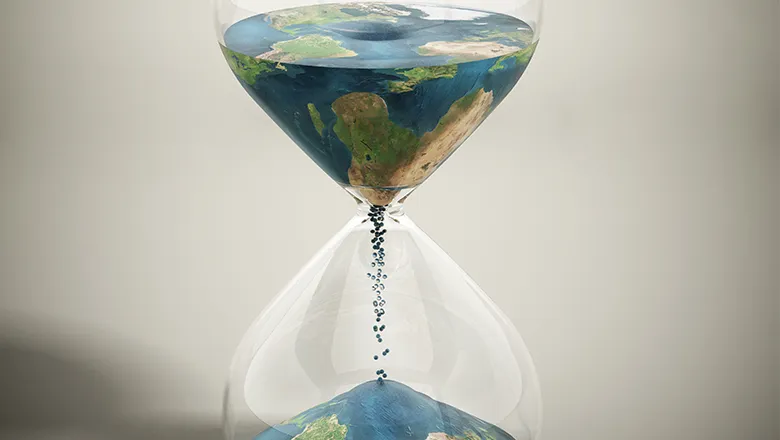We don't really know very much at all about what's our limits might be in different places to adaptation to climate change impacts and it's really an urgent area of new research and also policy intervention because we know that those who suffer the worst impacts and have the least capacity to adjust.
Professor Frans Berkhout
21 November 2022
Are we at a pivotal moment in the climate emergency?
A new podcast episode looks at where we are in the climate crisis, how recent events have affected the priority of environmental issues and whether we still have time to make a difference.

The latest episode of the WORLD: we got this podcast series explores whether we are at a pivotal moment in the climate crisis
It features two academics from the Faculty of Social Science & Public Policy at King’s College London who assess where we are on progress against global commitments, some of the impacts of climate change that are we already seeing and whether we will be able to adapt to our new world.
They also highlight ways in which environmental issues have already affected the geopolitical, economic and social order of our world, how the war in Ukraine has affected public focus on climate change and whether we are at a critical moment in public and political understanding of the need to take action.
The 2015 Paris Agreement set out the ambition to achieve net zero carbon emissions by the middle of this century and for average global temperatures to rise by no more than 1.5 to 2 degrees above preindustrial levels.
Professor Frans Berkhout, a Professor in Geography whose work encompasses the environment, technology, policy and climate change, says there is only a slight chance of us hitting the 1.5 degree target and only a 50-50 chance of meeting the two degree one.
He discusses some of effects this is already having around the world including flooding, droughts and fires, and changes people are making in order to cope. However, he warns there are not an infinite number of adaptation options available.
He also thinks many of the significant events of the last year, including war the Ukraine, the economic crises and extreme weather events such as floods and droughts, have only strengthened the case for working on climate change and as we move away from oil and gas it will bring huge changes.
My sense is that we are actually at a pivotal moment in the whole climate change debate and the whole transition towards zero carbon, which the world is now politically committed to. We all have wind and sun and now that is a very profound reconfiguration of political and economic power in the world. I don't think we've quite understood what that means for the global political economic system, but it is a very deep change that is happening.
Professor Frans Berkhout
Dr Duraid Jalili, a lecturer in the Defence Studies Department and Co-Director of King’s Environmental Security Research Group, discusses how exploiting the earth’s resources has affected the geopolitical and economic order of the world. He also outlines the many ways environmental issues affect security, including around food, water and resource availability, people’s health and critical infrastructure. There are some island nations who might need to relocate completely.
Some have warned that we could also see conflicts caused by migration linked to climate change. He says while there is evidence around climate migration within states, questions remain around the degree to which we’ll see mass migration between countries as the climate warms. He thinks we will see shifts in who holds power and in our global priorities because of the climate emergency but there is uncertainty in quite how that will play out.
He says events since the Russian invasion of Ukraine have had an interesting impact on public awareness around climate issues. And he thinks we are at a crucial moment.
I think we are at a pivotal time in the climate emergency, but I think we've been at a pivotal time in the climate emergency for the last 50 years, in a sense. What that means is that every moment is critical and the need for genuine, far reaching systemic change is critical. We are in a pivotal time definitely and we're going to remain in a pivotal time for the foreseeable future.
Dr Duraid Jalili
He says we need to maintain our pressure and focus on climate change as a critical issue.
We need significant binding governance and compliance systems. We need significant behavioural change. We need significant investment in climate funds for disenfranchised nations. We have agreements on a lot of these things, but we don't have follow-ups to those agreements. So, on a basic level as a priority, we need to fulfil the existing agreements that we have.
Dr Duraid Jalili
He says, from a security perspective, society needs to avoid fuelling social polarisation and create supportive communities. He highlights how climate change catalyses existing social problems, including poverty, health inequalities and food insecurities, so it is important to help to address those issues and create more resilient societies to help people cope with future challenges as our planet warms.


